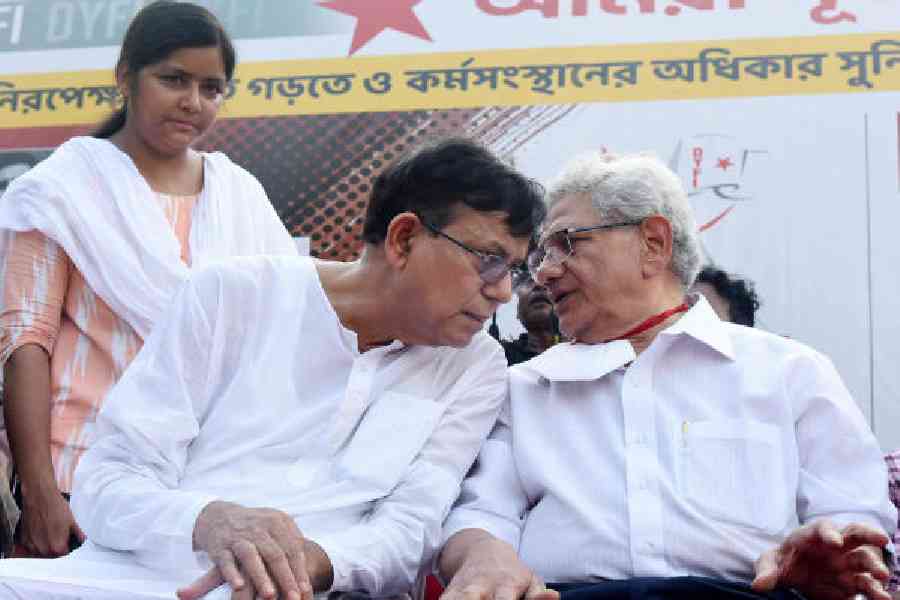I met Sitaram Yechury for the first time when I went to attend the all-India conference of the SFI in Mumbai in 1980. I was a young student activist and the conference platform allowed me to come in contact with Sitaram. Since then, it has been four-and-a-half decades that we have worked together. Sitaram’s untimely passing, for me, is in a true sense losing a friend, philosopher and guide.
The grief is even greater as Sitaram’s loss comes a little over a month after we lost our comrade Buddhadeb Bhattacharjee. As he was indisposed, Sitaram could not travel to Calcutta to take part in the last journey of Buddha-da and who knew that his recorded speech from AIIMS on August 22 for Buddha-da’s memorial meeting at Netaji Indoor Stadium would be in a sense his last public appearance.
Sitaram’s stood out among his comrades because of his affable nature. It did not matter to him whether the person was his ideological friend or foe. He would debate or discuss with an open mind, and his radiant smile would stick to him. Such was his amicable nature that he could win the hearts even of his harshest critics. Always accessible to everyone, journalists in Delhi would tell me that his friendly nature made him the “darling of the media”.
His accessibility was rooted in the days he spent in the students’ movement. A disciple of our leader (Makineni) Basavapunnaiah, Sitaram was theoretically sound and ideologically resolute.
A brilliant student, who graduated in economics from St. Stephen’s College in Delhi, Sitaram took a plunge into politics when he joined Jawaharlal Nehru University (JNU) as a postgraduate student in economics in the 70s. At the JNU, he began his political journey as a member of the Students’ Federation of India, where he was elected president of the students’ union thrice.
On multiple occasions, he showed his guts as a student leader. In 1978, when Sitaram was the JNU students’ union president, he read out a chargesheet against former Prime Minister Indira Gandhi in her presence. Although Indira had lost the elections in 1977, she continued to be the chancellor of the JNU, prompting Sitaram and his comrades to show defiance in front of the former Prime Minister. Such was his courage and spirit of resistance that Indira resigned from the post after the collective show of protest and Sitaram led the students to an iconic victory.
Talking about his days at the JNU reminds me of an incident involving Sitaram and me in Calcutta. Former Prime Minister V.P. Singh had rebelled, left the Congress and formed his political party Jan Morcha in 1987. Shortly after he formed the party, several Opposition parties came together to hold a meeting at Netaji Indoor Stadium. Political leaders who attended the meeting included V.P. Singh, (Hemvati Nandan) Bahuguna, Jyoti Basu and Sitaram. Apart from political leaders, eminent educationist Debiprasad Chattopadhyay was present, so was a respected JNU professor, whose name I cannot recollect right now.
As a DYFI leader, I was among the volunteers at the meeting and took care of the leaders while they took the stage. As I was carrying out my assigned duty,
Sitaram called me and said: “Aare there liye mujhe gali shuna diya (because of you I was reprimanded).”
I had no clue and asked him: “what wrong did I do?”
Then Sitaram told me what transpired between Debiprasad Chattopadhyay and his JNU professor, who was sitting next to V.P. Singh. Pointing at me, Prof Chattopadhyay, my teacher at Jadavpur University, told the JNU professor about me not enrolling for PhD despite his persuasions. And he said that it was because of my plunge into politics that I did not join research. At this, the JNU professor told Prof Chattopadhyay that he had a similar complaint against Sitaram. He had repeatedly asked Sitaram to complete his PhD but politics took him away from academics.
As all this happened in Sitaram’s presence, he called me to say that his teacher had forgotten about him not
doing PhD and now because of my professor and me, the issue came up. And then, as usual, he flashed his
unforgettable smile.
The other aspect of Sitaram that we will miss is his being the virtual ambassador for Bengal and his ability to converse in Bengali helped. Even before he became a Rajya Sabha member from Bengal, during the earlier regimes run by the Congress or the UPA, he was like an ambassador for Bengal in Delhi.
He was always there for the cause of Bengal and Jyoti Basu liked him very much. When Jyoti Basu and HKS Surjeet used to go on foreign trips as part of party delegations, they would take Sitaram along with them. This brought him in contact with communist and workers’ parties across the globe, a contact he maintained throughout.
What will be missed in the passing of Comrade Sitaram is his ability to strike a bond between parties across the spectrum. Whenever he came to Bengal, Sitaram would often say that the resurgence of the Left in India would not be possible without the rejuvenation of the CPM in Bengal.
As our comrade sleeps, we pledge to fulfil his dream.
(Md Salim, CPM state secretary, spoke to Joyjit Ghosh of The Telegraph)










